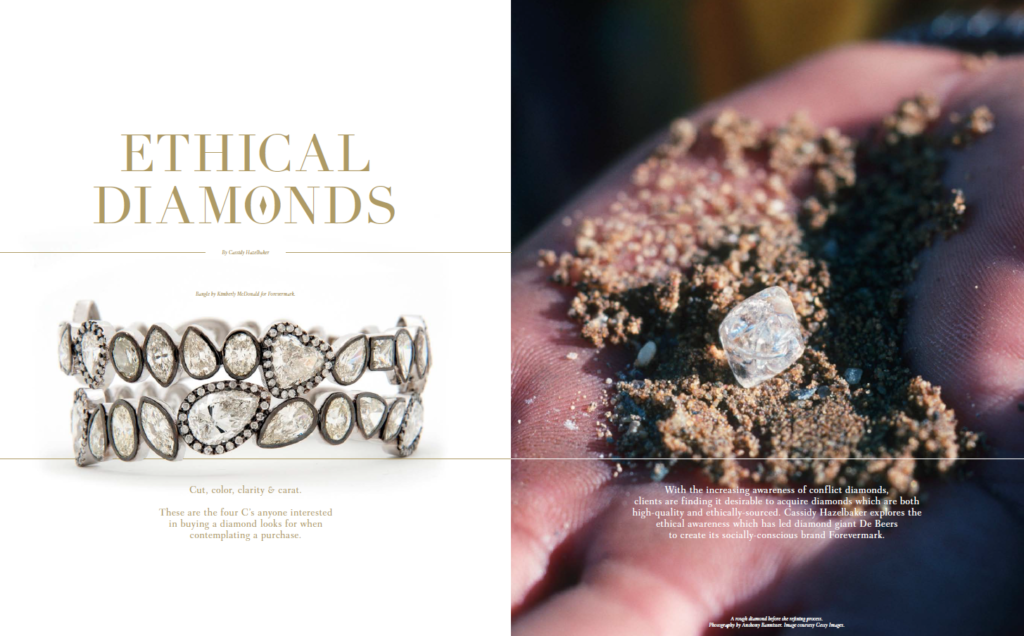Ethical Diamonds

With the increasing awareness of conflict diamonds, clients are finding it desirable to acquire diamonds which are both high-quality and ethically-sourced. Cassidy Hazelbaker explores the ethical awareness which has led diamond giant De Beers to create its socially-conscious brand Forevermark.
Conflict Diamonds and the Kimberley Process
Around two-thirds of the world’s diamonds are extracted from Africa. However, in the context of many civil conflicts occurring in some diamond-mining countries, notably Angola, Liberia, Sierra Leone, Zimbabwe, Republic of Congo and Democratic Republic of Congo, the diamond trade has often been a source of income for militants committing atrocities towards civilians. The link was first noticed in the late 1990’s when the United Nations Security Council passed a resolution in 1998 regarding the civil war in Angola. Later that year, the NGO Global Witness published the report ‘A Rough Trade,’ which documented the diamond trade in Angola and how it funded the conflict. More Security Council resolutions and international agreements followed, and in 2000, the diamond producing countries of southern Africa met in Kimberly, South Africa to discuss a plan to halt the trade in conflict diamonds. In 2002, the Kimberley Process Certification Scheme was created.
De Beers & the World Diamond Council
Diamond producer De Beers plays a pivotal role in enforcing the Kimberley Process. “De Beers is a founding member of the World Diamond Council, whose primary objective is to represent the diamond industry in the development and implementation of regulatory and voluntary systems to control the trade in diamonds covered by the Kimberley Process Certification Scheme,” states Janet Sussens, Head of Licensee Markets at Forevermark Diamonds.
There has been criticism of the Kimberley Process, as reports have surfaced that officials sign off the certification of diamonds which have not actually come from conflict- free certified mines. To assure purchasers that their diamonds do indeed originate from conflict-free sources, the World Diamond Council and its members have initiated a System of Warranties which includes a written declaration of the conflict-free nature of a diamond on all invoices. “Furthermore,’ declares Sussens, “De Beers only sells production from its own mines or those it mines in partnership with the governments of Botswana and Namibia so it can guarantee that 100 percent of its diamonds are from conflict free sources.”
Forevermark
In 2008, De Beers further promoted ethically-sourced diamonds and formally launched a new brand, Forevermark. The brand went beyond the 4Cs (cut, color, clarity and carat) and offered consumers an additional promise: each Forevermark diamond would be beautiful, rare and responsibly-sourced. Forevermark diamonds are carefully selected. They are sourced from select De Beers mines which are guaranteed to not only mine their diamonds in an ethically and socially conscious way, but also pledge to help the communities in which they are located through social initiatives such as promoting education programs for children and sponsoring meals for those in need. Sussens summarizes, “not only are Forevermark diamonds conflict-free, they also positively benefit the lives of people in the communities in which they are sourced.”
Moreover, Forevermark diamonds may only be cut and polished by diamantaires who have been carefully selected for their master craftsmanship. Only 31 companies worldwide have been approved to handle Forevermark diamonds. Each diamond is inscribed with an invisible-to-the-naked-eye Forevermark stamp along with a unique number which enables a buyer to be sure of the diamond’s authenticity and origin. Forevermark diamonds can either be purchased loose, be set in the design of the wearer’s choosing or appear in an elegant Forevermark jewelry piece.
Forevermark first launched in Asia, starting in Hong Kong and expanding to Japan and China. In 2012, it opened in India and the USA and started distribution through licensing agreements throughout North America and South Africa. The brand’s first Middle Eastern presence began last year in the UAE with an agreement to distribute through luxury jewelry retailer Damas, whereby the brand currently offers three collections: the Forevermark Setting Collection, the Millemoi Collection and the Encordia Collection, inspired by the ancient Greek knot of Heracles.
But it is the simplest setting which is most popular in the Middle East. “Despite Middle Eastern consumers’ love for ornate pieces, the best-selling collection in the region is the timeless Forevermark setting, which is usually presented as an engagement or bridal gift,” says Sussens. “Most consumers prefer elegant simplicity for a bridal piece, and the brand’s attractiveness also stems from the pride one takes in offering a gift which has responsible and ethically conscious roots.”
Ethical and beautiful pieces from Forevermark’s line have adorned the wrists and necks of celebrities such as Nicole Kidman, Gwyneth Paltrow, Jessica Alba, Michelle Williams, Uma Thurman and Carey Mulligan at high-profile events such as the Academy Awards. The appeal of wearing jewelry that is both opulent and ethical is obvious. In contemporary times when entertainers are as known for their work as for the causes they support, the opportunity to make a statement supporting conflict-free diamonds is one which cannot be missed.